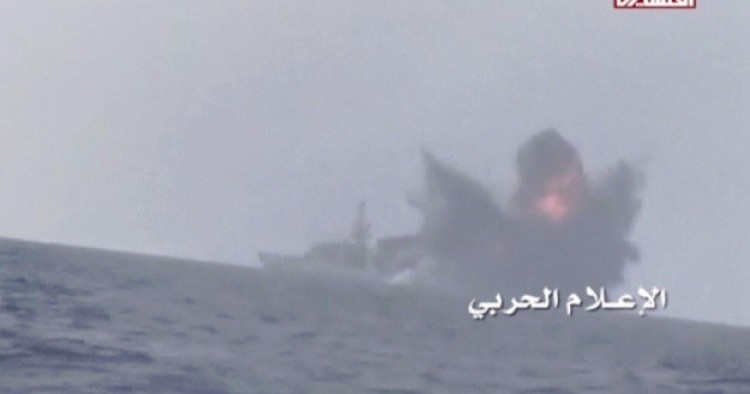The Islamic Revolution Guards Corps (I.R.G.C.) media outlets continue to justify and encourage attacks by Yemeni Houthi rebels against Saudi Arabia. I.R.G.C.-affiliated Fars News Agency, for example, ran a number of news stories and commentaries today glorifying the Houthis’ latest attacks against Saudi military targets, including a recent attack targeting a Saudi warship and a scud missile that the Houthis claimed hit a military base near the Saudi capital. Saudi officials rejected the Houthi claims that its missile hit a base close to Riyadh.
“Although America and Saudi Arabia are trying to confine the [boundaries of] war to the Yemeni shores instead of Saudi territory, the launch of Borkan-2 ballistic missile sent a message that the circle of war options are open to the Yemenis,” Fars wrote in a lengthy article. It also warned the U.S. military about the implications of deepening its involvement in the Yemeni war.
Another Fars commentary said that targeting Riyadh with a missile was part of the Houthi strategy. “If attacks against Sana’a, the capital of Yemen, continue, they [Houthis] will direct their attacks against Riyadh,” it said. “We witness that after two years since the start of the war, the Yemeni army [Houthi rebels] has the ability to attack the Saudi invading ships and army in the sea and air as well as on the ground.”
Comment: Over the past two years, Iran-backed Shiite Houthi rebels have been fighting against the Yemeni government and the Saudi-led coalition that supports it. Lately, the Houthis have targeted Saudi naval vessels in the Red Sea with more advanced weapons. As in today’s reports and commentaries in Fars, Iranian officials persistently claim that the Houthis’ sophisticated weaponry, including scud missiles, are domestically manufactured by the rebels. But the U.S. military and its allies have provided ample evidence in the past that shows Iran provides weapons to the group
Last month, the Australian government released photographs that showed anti-armor weapons seized near the Yemeni coast were manufactured in Iran. Analysts who surveyed the findings claim that the weapons confiscated match Iranian-made rocket-propelled grenade launchers used in Iraq and Ivory Coast in 2015. In November, another report published by the UK-based Conflict Armament Research (CAR) indicated an arms “pipeline” originating from Iran extended to Yemen and Somalia. And in October, U.S. officials reported on the seizure of five shipments of Iranian weapons destined for Yemen.
Indeed, Iranian officials no longer make secret of their attempt to prevent Saudi Arabia from succeeding in Yemen. Two months ago, Iran’s former ambassador to Iraq, Hassan Kazemi-Qomi admitted that Tehran “assisted the region’s oppressed people, including in Yemen.” In an interview with conservative Mashregh newspaper, he warned that Iran’s national security would be compromised if Riyadh succeeded in Yemen.
The Middle East Institute (MEI) is an independent, non-partisan, non-for-profit, educational organization. It does not engage in advocacy and its scholars’ opinions are their own. MEI welcomes financial donations, but retains sole editorial control over its work and its publications reflect only the authors’ views. For a listing of MEI donors, please click here.













